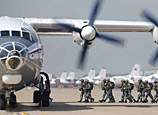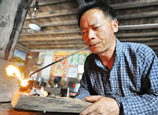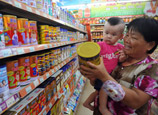
While China's top leadership has vowed to maintain steady growth in the second half of 2013, rising property prices amid a continuous economic slowdown are ringing alarm bells for the reform of the world's second-largest economy.
China's economy will maintain steady growth for the rest of this year amid "extremely complicated domestic and international conditions," according to a meeting of the Political Bureau of the Communist Party of China Central Committee on Tuesday.
The country's gross domestic product (GDP) growth slowed to 7.6 percent in January-June of 2013, the weakest first-half performance in three years, according to the latest official data.
In contrast to the slower growth, however, the prices of both new and existing homes continued to rise in most Chinese cities in June. Of a 70-city statistical pool, 63 Chinese cities saw month-on-month home price rises, official data showed.
Meanwhile, a recent quarterly survey of 350 real estate managers in 31 of China's big cities revealed that more than half of developers said they will increase supplies in the third quarter and raise prices.
The survey results were supported by adequate funding in the real estate sector. Data from the central bank showed that the balance of yuan-denominated lending to property developers stood at 13.56 trillion yuan (2.2 trillion U.S. dollars) at the end of June, up 32 percent from a year earlier.
Moreover, local governments' income from land sales soared 46.3 percent in the first half of 2013, compared to a 27.5-percent decline in the same period of last year, which indicated that land sales had been the major source of income for local governments.
"The real estate sector runs counter to other industries and people's stalled incomes," said Yin Zhongli, a finance researcher with the Chinese Academy of Social Sciences (CASS).
The alluring profit in the property market has worsened the credit shortage in the real economy. More than 70 percent of enterprises in Wenzhou, a city known as the cradle of China's private businesses, engage in property investment, figures from the Wenzhou City Economic and Information Commission showed.
High funding costs, rising labor prices and exchange rates have squeezed room for traditional industries like garments and glasses.
"Many companies are working to pay debts and they will even lose the chance to work at all if they fail to survive the credit crunch," said Zheng Chen'ai, head of Wenzhou's garment chamber of commerce.
The city's situation is a microcosm of the economy as a whole. Several leading economic indicators dipped in the first half. The preliminary purchasing managers' index for China dropped to 47.7 in July, down from a final 48.2 in June and the lowest in 11 months, an HSBC report showed. Meanwhile, exports took a surprising tumble in June, dropping 3.1 percent year on year, customs data indicated.

















 China launches level two emergency response to heat
China launches level two emergency response to heat


![]()
